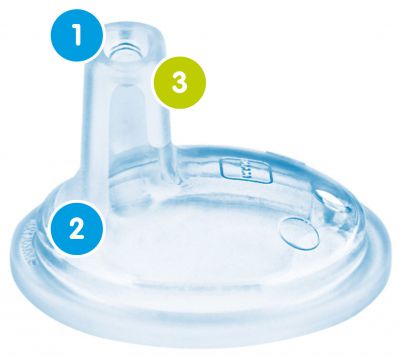Extra weicher Trinkschnabel für Trinkbecher 4+ Monate, Doppelpack
Passt auf alle MAM Becher
Produktbeschreibung
Mit dem Trinkschnabel ultra-soft ist der Übergang vom Stillen oder der Flasche zum Glas besonders leicht.
- Auslaufsicher – perfekt, um Babys Trinkfertigkeiten zu trainieren.
- Dank seiner SkinSoft™ Silikonoberfläche und der einzigartigen flachen Form, die sich so vertraut anfühlt, wird der MAM Sauger schnell von Babys akzeptiert.
- Passt auf alle MAM Becher

1. SCHLITZÖFFNUNG
Auslaufsicher – perfekt, um Babys Trinkfertigkeiten zu trainieren. Babys können die Durchflussrate selbst kontrollieren
2. SKINSOFT™ SILIKONSAUGER
von 94 %* der Babys akzeptiert. Für ein vertrautes Gefühl
von 94 %* der Babys akzeptiert. Für ein vertrautes Gefühl
3. ASYMMETRISCHE FORM
Ein Schritt näher am eigenständigen Trinken aus dem Glas
Ein Schritt näher am eigenständigen Trinken aus dem Glas
Dieses Produkt erfüllt die
Anforderungen der europäischen Norm
EN 14350:2020.
Passen auf alle MAM Becher.
Qualität & Sicherheit
94 % Saugerakzeptanz: schnelle Akzeptanz bei Babys – durch das vertraute Gefühl
Alle MAM Produkte sind aus BPA- und BPS-freien Materialien gefertigt.
MAM SkinSoft™ Silicone: easily accepted by babies - for a familiar feeling
Tropffrei - für erstes selbstständiges Trinken
Für Babys ab 4 Monaten
¹ Marktforschung 2009-2020, getestet mit 1,572 Babys.
Auszeichnungen
ENTWICKELT MIT MEDIZINISCHEN EXPERTEN:
Zusammenarbeit mit medizinischen Experten für maximale Sicherheit.
Erst wenn unsere medizinischen Experten ihre Zustimmung geben, ist eine MAM Innovation bereit für das Babyleben.
AUSGEZEICHNET MIT DEM EU-PREIS FÜR PRODUKTSICHERHEIT 2019
Ihr Baby bedeutet Ihnen alles, und deshalb tun wir alles, um Ihnen nur extra-sicherere Produkte anzubieten. Aus diesem Grund werden viele der MAM Innovationen in Partnerschaften mit medizinischen Fachkräften erforscht und entwickelt. Außerdem gehen unsere internen Sicherheitsstandards und Prüfkriterien weit über die Normen hinaus.
Diese Bemühungen wurden jetzt formell von der Europäischen Kommission anerkannt, die MAM mit dem renommierten EU-PREIS FÜR PRODUKTSICHERHEIT 2019 ausgezeichnet hat. Denn für uns gibt es nichts Erstrebenswerteres, als die gesunde Entwicklung von Babys zu unterstützen und das Alltagsleben für die Eltern leichter zu machen.
FAQ
Four-month-old babies love drinking from a cup. The MAM Cup range provides them with the ideal support here. This will ensure that baby makes the perfect transition from breastfeeding or bottle feeding to independent drinking.
Bisphenol A (BPA) is an important component for the manufacturing of polycarbonate (PC), whereas Bisphenol S (BPS) is an organic chemical used to make polysulfone. Among other items, food packaging, plastic utensils and baby bottles are just a few examples of products made with PC, whereas the main usage of BPS is in thermal papers and inks. The problem: Trace amounts of chemical substances gradually leach out of the plastic into the food and might eventually get into the body. This can affect small children and infants in particular.
As a result of exposure to BPA, experts and studies have seen disruptions to the hormone system and brain, diabetes and heart damage as well as an increased risk of cancer. Although scientific evidence is not yet conclusive, the European Commission - based on the precautionary principle - has banned the usage of BPA in baby bottles in order to protect the health and safety of babies and small children.
Gebrauchshinweise